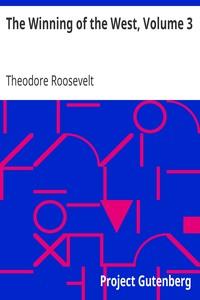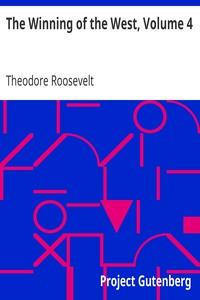|
|
Read this ebook for free! No credit card needed, absolutely nothing to pay.Words: 113154 in 18 pages
This is an ebook sharing website. You can read the uploaded ebooks for free here. No credit cards needed, nothing to pay. If you want to own a digital copy of the ebook, or want to read offline with your favorite ebook-reader, then you can choose to buy and download the ebook.

: The Winning of the West Volume 2 From the Alleghanies to the Mississippi 1777-1783 by Roosevelt Theodore - Northwest Old History; West (U.S.) History; United States Territorial expansion@FreeBooksTue 06 Jun, 2023 CHAPTER APPENDICES: INDEX THE WAR IN THE NORTHWEST, 1777-1778. The Tribes Hold Councils at Detroit. In the fall of 1776 it became evident that a formidable Indian war was impending. At Detroit great councils were held by all the northwestern tribes, to whom the Six Nations sent the white belt of peace, that they might cease their feuds and join against the Americans. The later councils were summoned by Henry Hamilton, the British lieutenant-governor of the northwestern region, whose head-quarters were at Detroit. He was an ambitious, energetic, unscrupulous man, of bold character, who wielded great influence over the Indians; and the conduct of the war in the west, as well as the entire management of frontier affairs, was intrusted to him by the British Government. He had been ordered to enlist the Indians on the British side, and have them ready to act against the Americans in the spring; and accordingly he gathered the tribes together. He himself took part in the war-talks, plying the Indians with presents and fire-water no less than with speeches and promises. The headmen of the different tribes, as they grew excited, passed one another black, red or bloody, and tomahawk belts, as tokens of the vengeance to be taken on their white foes. One Delaware chief still held out for neutrality, announcing that if he had to side with either set of combatants it would be with the "buckskins," or backwoodsmen, and not with the red-coats; but the bulk of the warriors sympathized with the Half King of the Wyandots when he said that the Long Knives had for years interfered with the Indians' hunting, and that now at last it was the Indians' turn to threaten revenge. Lt-Gov. Henry Hamilton. Scalp Buying. Hamilton was for the next two years the mainspring of Indian hostility to the Americans in the northwest. From the beginning he had been anxious to employ the savages against the settlers, and when the home government bade him hire them he soon proved himself very expert, as well as very ruthless, in their use. He rapidly acquired the venomous hatred of the backwoodsmen, who held him in peculiar abhorrence, and nicknamed him the "hair-buyer" general, asserting that he put a price on the scalps of the Americans. This allegation may have been untrue as affecting Hamilton personally; he always endeavored to get the war parties to bring in prisoners, and behaved well to the captives when they were in his power; nor is there any direct evidence that he himself paid out money for scalps. But scalps were certainly bought and paid for at Detroit; and the commandant himself was accustomed to receive them with formal solemnity at the councils held to greet the war parties when they returned from successful raids. The only way to keep the friendship of the Indians was continually to give them presents; these presents were naturally given to the most successful warriors; and the scalps were the only safe proofs of a warrior's success. Doubtless the commandant and the higher British officers generally treated the Americans humanely when they were brought into contact with them; and it is not likely that they knew, or were willing to know, exactly what the savages did in all cases. But they at least connived at the measures of their subordinates. These were hardened, embittered, men who paid for the zeal of their Indian allies accordingly as they received tangible proof thereof; in other words, they hired them to murder non-combatants as well as soldiers, and paid for each life, of any sort, that was taken. The fault lay primarily with the British Government, and with those of its advisers who, like Hamilton, advocated the employment of the savages. They thereby became participants in the crimes committed; and it was idle folly for them to prate about having bidden the savages be merciful. The sin consisted in having let them loose on the borders; once they were let loose it was absolutely impossible to control them. Moreover, the British sinned against knowledge; for some of their highest and most trusted officers on the frontier had written those in supreme command, relating the cruelties practised by the Indians upon the defenceless, and urging that they should not be made allies, but rather that their neutrality only should be secured. The average American backwoodsman was quite as brutal and inconsiderate a victor as the average British officer; in fact, he was in all likelihood the less humane of the two; but the Englishman deliberately made the deeds of the savage his own. Making all allowance for the strait in which the British found themselves, and admitting that much can be said against their accusers, the fact remains that they urged on hordes of savages to slaughter men, women, and children along the entire frontier; and for this there must ever rest a dark stain on their national history. Hamilton organized a troop of white rangers from among the French, British, and Tories at Detroit. They acted as allies of the Indians, and furnished leaders to them. Three of these leaders were the tories McKee, Elliot, and Girty, who had fled together from Pittsburg they all three warred against their countrymen with determined ferocity. Girty won the widest fame on the border by his cunning and cruelty; but he was really a less able foe than the two others. McKee in particular showed himself a fairly good commander of Indians and irregular troops; as did likewise an Englishman named Caldwell, and two French partisans, De Quindre and Lamothe, who were hearty supporters of the British. The British Begin a War of Extermination. Hamilton and his subordinates, both red and white, were engaged in what was essentially an effort to exterminate the borderers. They were not endeavoring merely to defeat the armed bodies of the enemy. They were explicitly bidden by those in supreme command to push back the frontier, to expel the settlers from the country. Hamilton himself had been ordered by his immediate official superior to assail the borders of Pennsylvania and Virginia with his savages, to destroy the crops and buildings of the settlers who had advanced beyond the mountains, and to give to his Indian allies,--the Hurons, Shawnees, and other tribes,--all the land of which they thus took possession. With such allies as Hamilton had this order was tantamount to proclaiming a war of extermination, waged with appalling and horrible cruelty against the settlers, of all ages and sexes. It brings out in bold relief the fact that in the west the war of the Revolution was an effort on the part of Great Britain to stop the westward growth of the English race in America, and to keep the region beyond the Alleghanies as a region where only savages should dwell. All the Northwestern Tribes go to War. Free books android app tbrJar TBR JAR Read Free books online gutenberg More posts by @FreeBooks

: A Narrative of a Nine Months' Residence in New Zealand in 1827 by Earle Augustus - New Zealand Description and travel@FreeBooksTue 06 Jun, 2023
|
Terms of Use Stock Market News! © gutenberg.org.in2025 All Rights reserved.






